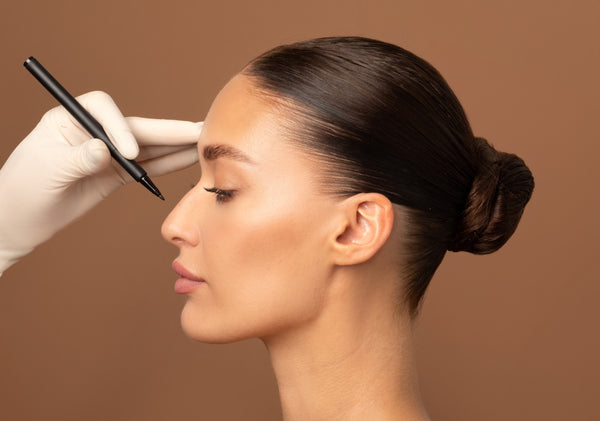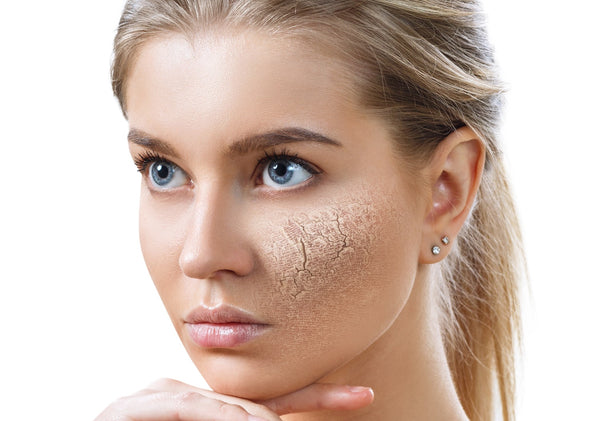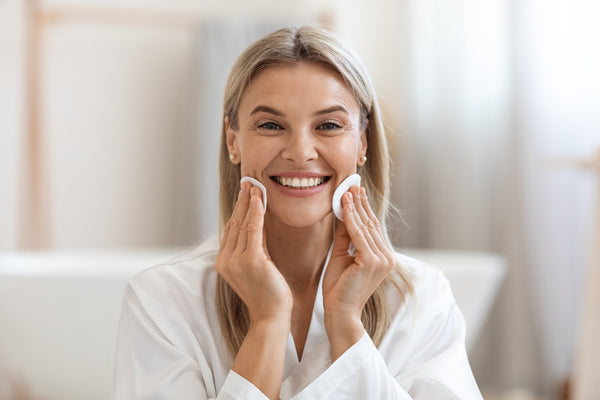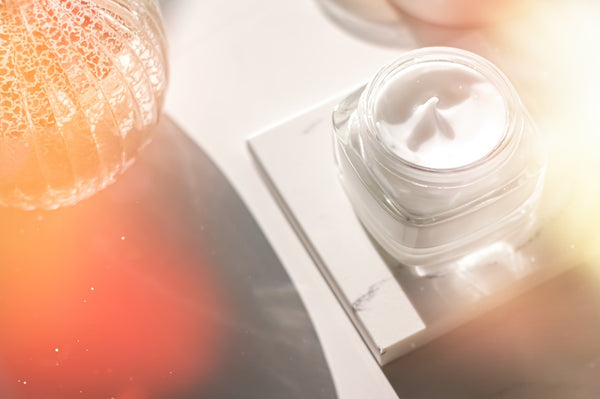How to Protect Your Skin Barrier: A Guide to Healthy Skin

Looking to repair your complexion leaving it feeling soft, supple, and nourished? Let's take a deep dive into our guide to a healthy skin barrier with restorative tips you may not have known existed.
After years of drying our faces with harsh products and soaps, science has found the secret to radiant, soft, nourished skin. But what is a skin barrier? We'll admit - that even the most skin enthusiasts have trouble breaking this term down. Understanding how to evaluate and support your skin barrier is the best way to get you that summer-ready glow that you've been looking for.
We're cracking the code and feeling you in with the scoop on the basics, signs of damage, and how you can help support your skin barrier, today.
What is the skin barrier?
The skin barrier is exactly what it sounds like — a barrier between the softer, more vulnerable layers of your skin and the outside world. It’s also known as a protective “acid mantle” that holds a certain level of acidity to protect against environmental toxins, bacteria, and excess dirt and oil. To fully understand what the skin barrier is and how to best care for it, we have to understand the structure of our skin.
Your skin is made up of three main layers:
- The epidermis: This is the outermost layer of your skin, and it is the visible layer that you care for with your skincare routine.
- The dermis: This layer lies just under the epidermis and houses your skin's collagen and elastin elements. Your nerves and blood supply are also found here.
- The hypodermis: The hypodermis is a fatty tissue layer that lies between the skin and the muscle, providing extra protection and cushion.
Your skin barrier is the topmost layer of the epidermis and comes into contact with the outside world and environmental toxins daily.
Besides protection, what does the skin barrier do?
More than simply protecting the deeper layers of skin, your skin barrier is responsible for helping to lock in moisture and to keep your skin naturally hydrated.
Your skin barrier can also provide UV blockage against the sun’s harmful rays, which can lead to conditions such as skin cancer and premature aging with prolonged exposure.
What damages your skin barrier?
Everything that you’re exposed to daily has the potential to disrupt your skin barrier. We run into environmental toxins so frequently in our products, the foods we eat, and the air we breathe. Because of this, we can’t control whether or not we damage the barrier. We will.
What we can do is control how we repair and replenish the damage and mitigate the risk of higher than average exposure. Additional high-risk exposure opportunities to avoid include:
- Smoking
- Use of dehydrating or abrasive cleansers
- Stress
- Insomnia or sleep disruptions
- Waxing
- Physical damage (i.e., face picking or “popping” pimples)
We also want to note that while exfoliants can cause damage to your skin’s protective barrier, they are sometimes necessary to keep your skin free of dead cellular buildup. Working with a dermatologist can give you the insight that you need to find success with your specific skin and offer you a plan of action to effectively manage and protect your skin against damage and aging.
What are the signs of skin barrier damage?
Since the skin barrier lies just on the surface of the epidermis, there’s more opportunity for damage to occur. Past skincare fads of rough exfoliants, chemical peels, and other types of harsh products haven’t helped us to preserve and protect this very important layer, which is where you’ll begin to see the first warning signs of damage. These present differently in everyone and may include symptoms like:
- Dehydration. This shows up in your skin barrier as a flakey or texturally dry appearance, which can feel rough or otherwise unpleasant to touch. It may also make you uncomfortable, as dry skin can be very itchy and feel “tight.”
- Rosacea. While there are also genetic causes for Rosacea, those with skin barrier damage can also experience a “flare” or similar symptoms. With Rosacea, you may see visible discolored patches on your skin, as well as visible blood vessels.
- Eczema. Eczema is a condition that you can experience without a damaged skin barrier but is also a very common symptom of barrier damage. Eczema is indicated by dry, irritated, and flakey skin and requires moisturizers and treatment to address.
- Skin infections. While unpleasant, a broken skin barrier could lead to a higher risk and instances of infection. You may notice presentations of this symptom that include open wounds, bouts of cystic acne, or other types of disruptions.
How to treat a damaged skin barrier
Despite the amount of exposure your skin barrier gets on daily, it is possible to care for and nourish your skin barrier — and to unlock healthy, radiant skin.
Below, we’ve listed our top three ways to revitalize and nourish your skin barrier:
- Dial-in your skincare routine
Consistency is key when your end goal is naturally clear and glowing skin. Working to heal your skin barrier and undo the damage from toxin exposure will give you a more youthful, moisturized, and naturally radiant look, getting you that anti-aging effect that no product can compare with. That’s why you need a routine that’s tailored to your skin and covers all the necessary bases to rejuvenate and replenish your skin barrier.
Read on for a few suggestions to help you level up your skincare game:
- Sunscreen: We all need a little help sometimes! Adding in a sunscreen with powerful UV coverage is vital to help protect your skin barrier. Since it naturally works against the sun’s rays' damage to your skin daily, you can unlock additional benefits by giving your barrier a boost. Be sure to look for a product that doesn’t contain drying additives, alcohols, or dyes.
- Moisturizer: While this is a given in our skincare routines, we can’t stress the importance of a quality moisturizer enough! Choose an option that’s packed with antioxidants and nourishment and that is designed to last all day long.
- Retinol Serums: These are a must-have, and have soared to mainstream use thanks to all of the skin benefits that you can see with each use. Retinols encourage cell turnover, leaving you with visibly brighter, glowing skin. Pairing retinol with a Vitamin C serum gives your skin barrier extra support, counteracting potentially thinning effects of the retinol with enhanced moisturization and absorption abilities.
2. Tailor your routine to your skin's needs
With skincare, there is no “one-size-fits-all.” While you can gain additional benefits from working with a skincare specialist, that may not always be an accessible option for everyone. Identifying your skin’s current needs through the symptoms you see (i.e., dryness or redness) can help you know where to start providing extra support via your skincare routine. Stay aware and be sure to track any changes you notice from the start of your healing journey and the addition of any new products.
3. Eat clean for glowing skin
Diet support is a great way to support your skin barrier. Consider limiting your processed foods, and lean more into whole foods and high-quality proteins. Eating protein sources high in heavy fats, such as fish, can naturally boost your skin’s anti-aging qualities. You can also unlock the same benefits with vegan options, such as walnuts, avocados, and certain seeds.
Wrapping it all up
Your skin barrier is one of the most important and protective parts of your skin — and could use a little extra love for all that it’s doing for you! You can support your skin barrier by creating targeted and strategic skincare routines, investing in quality products, and managing your diet and lifestyle to mitigate the risk of toxin exposure.









